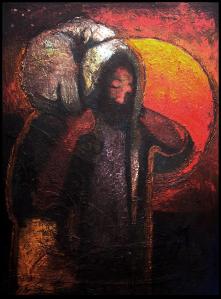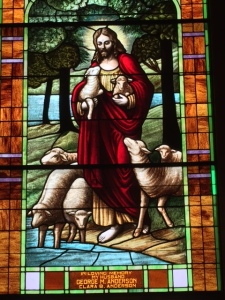 Scripture Passage (Genesis 15: 1-6)
Scripture Passage (Genesis 15: 1-6)
After these things the word of the Lord came to Abram in a vision, “Do not be afraid, Abram, I am your shield; your reward shall be very great.” 2But Abram said, “O Lord God, what will you give me, for I continue childless, and the heir of my house is Eliezer of Damascus?” 3And Abram said, “You have given me no offspring, and so a slave born in my house is to be my heir.” 4But the word of the Lord came to him, “This man shall not be your heir; no one but your very own issue shall be your heir.” 5He brought him outside and said, “Look toward heaven and count the stars, if you are able to count them.” Then he said to him, “So shall your descendants be.” 6And he believed the Lord; and the Lord reckoned it to him as righteousness.
We are told over and over to not be afraid. But we still want a guarantee. We WANT to believe that God will work it all out; we WANT to believe that God will sustain us; we WANT to believe, but we’d like to know when things will get worked out to at least our satisfaction, if not our comfort and ease. Now this passage is probably better translated as “trust” than “believe”. Is it the same? Well, probably close. But we tend to think of believing in something as knowing that it’s right. That’s not really right, but it’s what most of us have fallen into. In the 16th century, the Saxon meaning depicted it as “to hold dear or love”. That’s different. That’s WAY different. Do you follow because you think it’s right or because you love it and hold it dear? So is belief more about facts or about the meaning it brings to your life?
When we are told not to be afraid, it seems to be more of a call to trust, rather than merely believe. You can believe something, maybe know it’s right in your deepest being, and yet not fully give yourself to it. But Abram was told to trust, to give himself to it. “Come, Abraham. Trust it. Follow it. Give yourself to it. Hold it dear and love it. Become it.” And the covenant, the relationship, came to be.
This journey that we’re on is not, of course, a straight and unhindered pathway. There are hills to climb and valleys to maneuver. There is a wilderness to traverse. There are things that come along and get in our way and change our whole schedule when we least expect it. (I had some of those the last few days, which is why I’m WAY behind on “daily meditations”. So, I owe you four extras somewhere along the way!) But we’re not just called to mindlessly and aimlessly follow what we believe to be true. We are instead called to trust it in our deepest being, to turn ourselves over to it, if you will. It doesn’t mean that there won’t be “blips” along the way. After all, Abraham (formerly known as Abram) would become the father of three major world religions, but he was perfect. He probably wasn’t even trustworthy. We all know he tried to manipulate the outcome of it all a bit. But this faith journey is not about making us perfect humans; it’s not about our blind acceptance of what we do not understand; it’s about relationship. Faith is about realizing and trusting that we are part of a deep and abiding relationship between God and humanity, actually between God and all of Creation as the holy and the sacred pours into our being bit by bit. No, it makes no sense in terms of this world. That’s what makes it faith. That’s what Lent teaches us. So, do not be afraid. Follow what you love and hold dear and I’ll walk it with you.
Meaning does not come to us in finished form, ready-made; it must be found, created, received, constructed. We grow our way toward it. (Ann Bedford Ulanov)
Thank you for sharing your Lenten journey with me!
Grace and Peace,
Shelli







